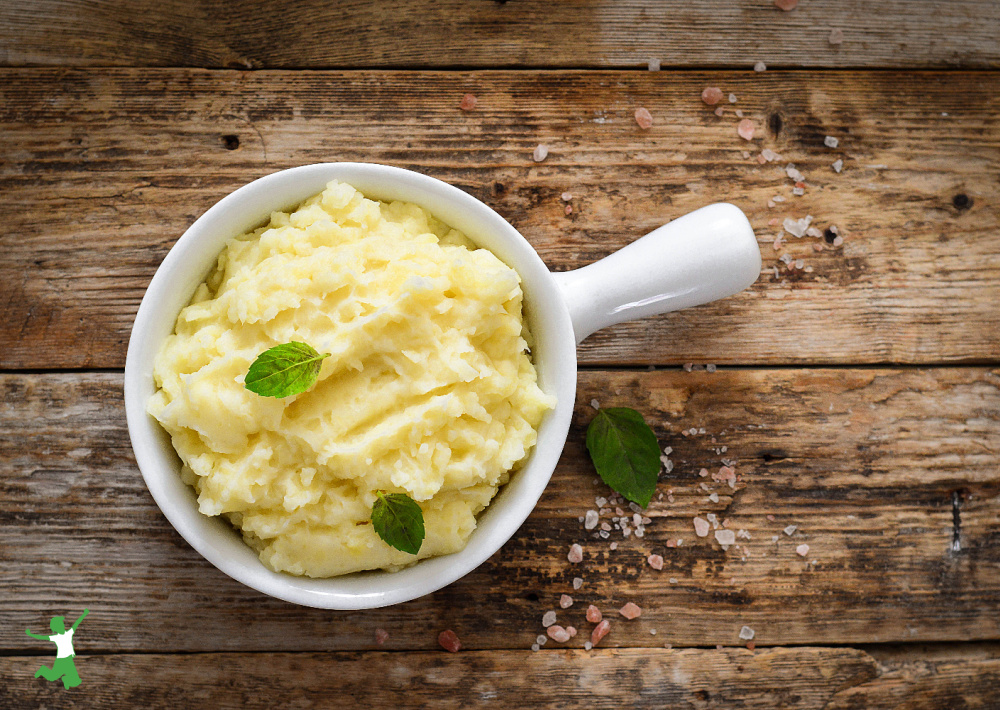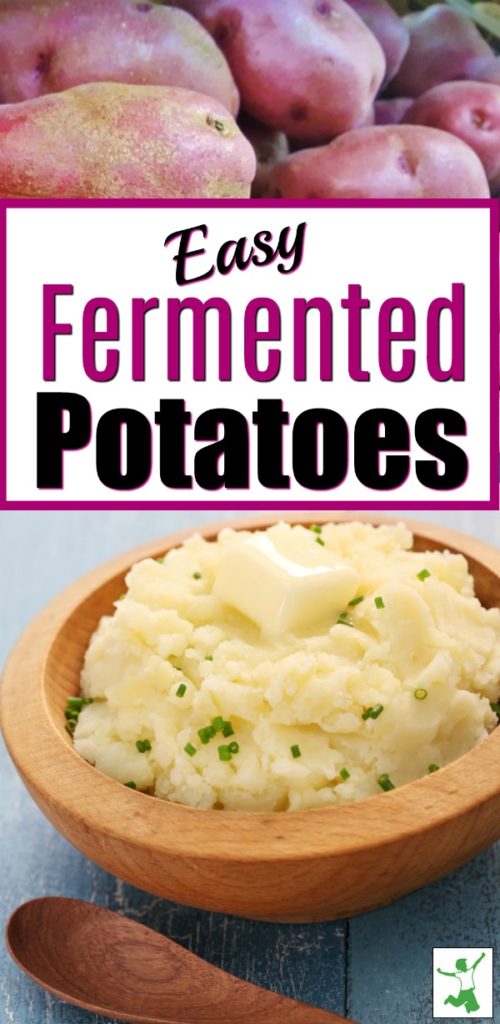Table of Contents[Hide][Show]
Traditional method for fermented potatoes as an enzyme-rich, cultured side dish that adds probiotics and resistant starch to the diet.

Is there anything quite as satisfying as mashed potatoes with dinner? I just love all forms of potatoes… baked, fried, mashed, even boiled!
This recipe provides a traditional method (with video how-to) for making fermented potatoes to add to your spuds repertoire.
Why would you want to make cultured potatoes in the first place? Because, unfortunately, the starch in potatoes is really not all that easy to digest for many people.
Especially these days with so many people suffering from digestive complaints of all kinds, starch can be a real pain…quite literally!
Potatoes are also nightshade vegetables, so lightly culturing them can help with any issues for those who are sensitive.
The problem is with the starch molecule itself. Each one is quite complex…comprised of hundreds of mono-sugars connected in long, branch-like strands.
It takes much digestive work to break down the starch molecule and, as a result, much of it goes undigested in most cases.
For those with an imbalanced gut, the undigested starch is the perfect food for pathogens and they grow and produce toxins that cause a variety of unpleasant symptoms in susceptible individuals.
Easy-to-Digest Cultured Potatoes
If you enjoy potatoes but find that they trigger digestive or autoimmune symptoms, it might be worth it for you to try your hand at fermenting them.
I prefer Yukon Gold as it seems to make the tastiest dish! Red or purple potatoes are also amazing.
If you are coming off the GAPS, AIP or SCD diets and reintroducing resistant starch to your diet after a period of gut healing, fermented potatoes would be a great first step.
While resistant starch is reduced during cooking, the bonds reform when the potatoes are cooled and these “new resistant starches” remain even if the dish is reheated before eating! (1)
We like this dish in our home to simply add that probiotic element to a meal of primarily cooked foods. Adding enzyme-rich, live food to your meals is nothing short of miraculous for boosting immunity and improving nutrient absorption.
If you’ve been wanting to make a fermented dish at home for the first time, this would be an easy and delicious one to start with!
The video demonstration included with the recipe below shows how to make probiotic potatoes using the Nourishing Traditions method.
If you are not eating white potatoes, feel free to substitute sweet potatoes instead.
Dairy-free? Try this fermented sweet potatoes recipe that uses sauerkraut juice instead of yogurt as the starter.

Fermented Potatoes Recipe
This recipe for fermented potatoes is an enzyme and probiotic-rich side dish that adds resistant starch that is more easily digested and shown to reduce belly fat.
Ingredients
- 4 cups white potatoes preferably organic
- 2 cups whole milk yogurt plain, preferably organic
- 1 Tbsp sea salt
Instructions
-
Peel the potatoes. This greatly reduces the chances of fermentation mold. Bake or boil potatoes and then mash them in a large glass bowl. Do not microwave.
-
With a handheld mixer or food processor, blend well with yogurt and sea salt once the potatoes are warm and no longer hot.
-
Cover with a clean, cotton cloth and secure with a rubber band. Leave the covered bowl on the counter for 2 days and then refrigerate. They will last about a month.
-
Serve with steak as an enzyme-rich side dish or with any meal where potatoes work well.
-
You may reheat cultured potatoes on the stove before serving, but take care not to warm them too much or enzymes and probiotics will be lost. Keep below 118 °F/ 48 °C.
Recipe Video

(1) Eat This Carb and You Won’t Gain Weight








Thanks for the recipe. I just though even if one over heats the fermented mash, it will still be easier to digest because some work has been done by the bacteria??
Hi, Sarah
I made the potato salad and it is suppose to taste a little sour right? I am new to fermenting foods and drinks only 2 months now, just wondering. By the way so glad I found you on here.
Yes … a bit sour but not at all unpleasant 🙂
I fermented cooked diced organic yukons. When I cooked my potatoes, I added a small amount of onion and garlic, and when all was soft let it cool to room temp. I then mixed in some homemade sauerkraut juice… about 4 Tablespoons of the juice and celtic salt to taste. I then packed it in a quart jar (poured boiling water to clean first then cooled it) I put a top on the jar and let it sit 24 hours in a warm dark place. It was ready! SO DELICIOUS!! …. you might need more time for fermenting.. just depends.. maybe a couple days..just taste and see. YUM
Hello there – I am making this ferment for the first time (with a mixture of sweet potatoes, regular potatoes, horseradish and a beet). Today is day 2. I had a peek last night and it is covered with something that looks like kahm yeast. I’m still pretty new at all this. Is this ok? Is that what it’s supposed to look like? Do I just mix it up, put it in the fridge?
This begs to be done….Wondering if one can use water kefir or sauerkraut juice for the fermenting process?…I sadly lack a digestive enzyme for any dairy…Is this a possibility?
Thank you for such a fantastic idea and recipe!
I made these and they were so delicious. I don’t know how I could ever live without preparing potatoes this way. When done I fry them in coconut oil with onions and season to taste.
That sounds awesome. I’m on it.
was so looking forward to making this until I heard you had to use raw products, we can’t get anything Raw in Oklahoma,
Do you know if this can be done with water kefir? Thanks
Hi Sarah,
I love your videos, thank you for providing so many of them!
I want to use these fermented potatoes for backpacking meals. If I dehydrate them, will there be any problem with storage (I am thinking 2-4 weeks storage)? Such as, because of the live cultures, will they continue to ferment if stored dehydrated at ambient/room temps (assuming dehydrating under 118F)?
FYI, I fermented my batch (first and only so far) leaving the skins on organic Yukons, no mold issues. I am in the Pacific NW, where it is humid, but not nearly as so as Florida.
Hi Sarah,
Why don’t you ferment the patatoes before cooking them like for French fries?